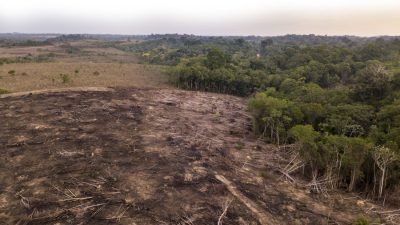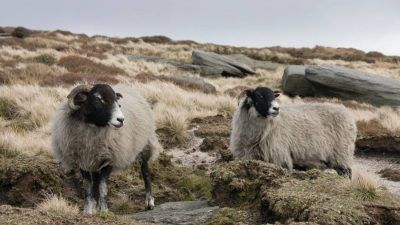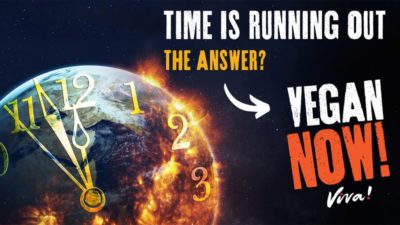Lord of the Wild – Viva!life 85
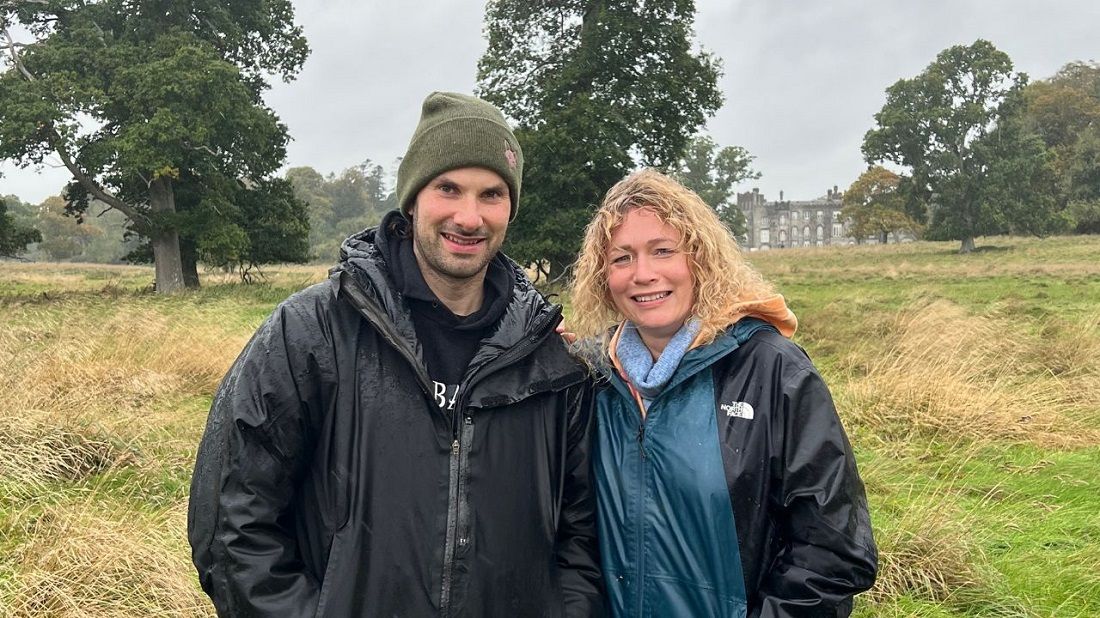
Randal Plunkett, 21st Lord of Dunsany, chats with Viva! founder, Juliet Gellatley, about the pleasure and challenges of rewilding his Irish estate
Featured in Viva!Life 85/Summer 2023
My arrival at Dunsany estate in Ireland couldn’t have been more dramatic. With my son Jazz, I drove down a long driveway in lashing rain towards the huge grey castle ahead of us. Built in 1180, it is the oldest home in Ireland to have been continuously occupied by a single family.
Thunder rumbled as we approached the ancient wooden front door and my imagination ran wild. The pictures I’d seen of the castle’s 40-year-old owner were of a striking man, mean and moody, dressed in death metal tees and fake, black leather jackets. I’d met him just once, at an awards ceremony, and wondered how welcoming Randal Plunkett, the 21st Lord Dunsany would be!
He runs an estate but also makes films and as we stepped into the cavernous hallway with its display of swords and guns and a Medieval suit of armour, I thought we’d walked onto one of his film sets. But no – it was all for real and all part of the castle’s long history, of which Randal is extremely knowledgeable and respectful, despite being very much of this century. He immediately made us feel at home and we spent a weekend chatting and laughing. His dry, entertaining wit is delivered with an American-Irish accent as his early years were spent in New York.
The Dunsany estate runs to 1,600 acres, 750 of which Randal is rewilding – ‘V-Wilding’ as he calls it. I’ve seen too many rewilding projects that ‘control’ animals such as deer and use cattle and pigs to supposedly regenerate the land – and who end up as burgers and sausages. But here, the land is being returned to its rightful owner – nature – without interference. This is vegan rewilding with no killing. So how did Randal become the visionary he is?


“I was the biggest proponent of eating steak – raw eggs for breakfast! But it hit me that it’s not good for you to live by death and I was beginning to wake up to the severity of the climate crisis. It was an epiphany. I’m not judging anyone but in 2014, I made the step to go vegan as it’s better for the environment. Then I discovered the scale of animal agriculture and the abhorrent way animals are farmed.”
Randal has a gorgeous baby daughter, Constance, with his beautiful, warm and down-to-earth partner, Laura Dillon, and it’s they who have amplified the urgent need for change. He told me:
“I think we all create our own reality; make our own world; we have choices. We are eating away our future one hamburger at a time and yet we can all decide what’s on our plate.” Randal changed his diet, shunned leather, ended all animal production on the estate and allowed the land to evolve into a wildlife sanctuary.
Interestingly, as a young man he had planned to reject the responsibility of being caretaker of the Dunsany heritage. He explains:
“The Plunkett family has included famous poets, writers, artists, soldiers, politicians and even a saint. The legacy is a big one to keep safe and my father taught me I must add something meaningful to it. I’m an historian, a storyteller and a caretaker but I also have to be a soldier to protect my estate. These are things I learned from about the age of five – a heavy burden for a child. I wanted to have a life – something that was mine – so I was very unhappy. Essentially you’re trapped. It’s a beautiful prison with paintings in it, but a prison nonetheless.”
When his father Edward died, Randal succeeded to the title and estate aged 28 and became Lord Dunsany. The ‘something meaningful’ he could pass on springs from his vegan beliefs and knowledge. “I was now steward of the land and realised our battle was climate change.
“My father would say: ‘If you don’t like something, do something about it!’ Animal agriculture is the biggest destroyer of forests and biodiversity, and the biggest polluter. Humans have a toxic relationship with nature – we take, take, take and so I decided to try and put something back!
“First, I thought ‘nature conservation’ but that sounds as sexy as Brits in Spain in sandals and socks. Then I heard about rewilding and thought: ‘Yeah, that would sound good on a tee’. To me, rewilding is the restoration of nature’s processes through organic actions. Or, put another way, we leave nature alone and let it do the business.”
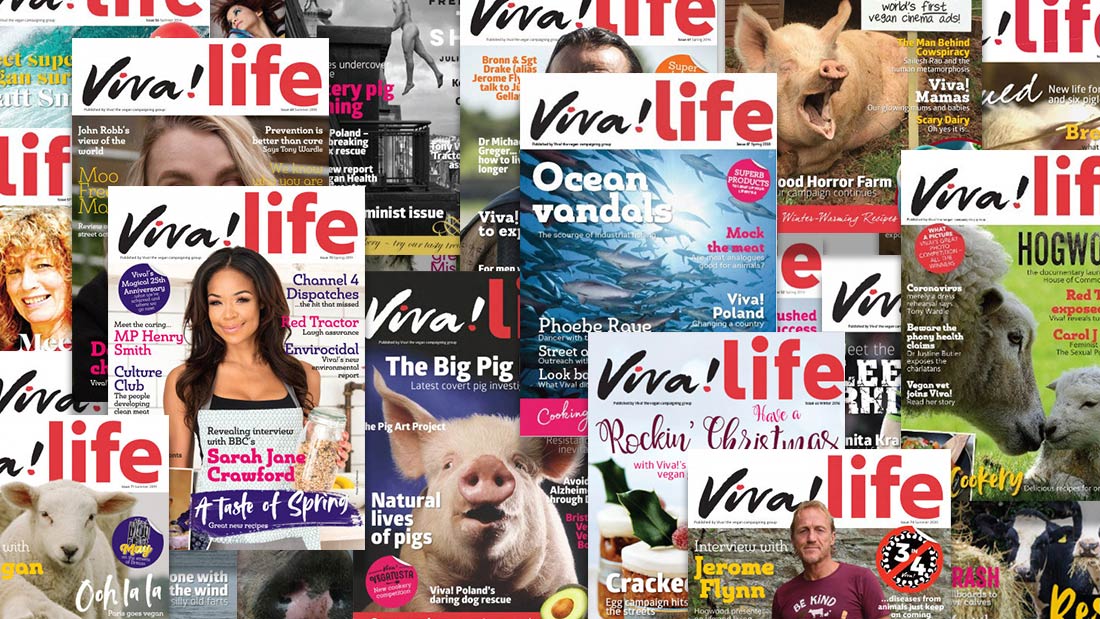
Are you enjoying this article?
This piece was originally published in Viva!life, our exclusive quarterly magazine for Viva! members. Viva!life features editorials on our latest campaigns and investigations, exclusive celebrity interviews, ethical businesses, health news, plant-based cookery, and vegan trends.
By joining Viva! for as little as £1.50 a month, you will get Viva!life magazine delivered straight to your door four times a year, so you can be the first to read our new features — as well as lots of other great benefits!
I asked Randal about other rewilding projects that use cattle and pigs. “It’s an excuse to keep having hamburgers! It’s better than intensive farming but it’s a half step and we need big steps. There’s a freight train coming and we’d better get out of the way!”
Randal spent hours showing Jazz and I around the land. Starting with no experience, his knowledge is now incredible. As we walk and talk, he breaks off when he sees something of interest. “Look there is badger poo, they have been eating…” “This is a horsetail, a prehistoric species used in battle to sterilise wounds …” “There’s a yew tree! Everything is poisonous but it has the sweetest berry in Ireland that’s not poisonous but the pip inside – two and you’re dead!” With morbid fascination I asked is it a quick death? “Not very quick, no, you die horribly!”
It must have taken some nerve to not interfere with nature.
“I was told the land would be full of weeds and they were right! It exploded with them! In Ireland, you’re fined for having certain weeds so with gritty determination I put on pink kitchen gloves and started pulling them out, because I refused to use chemicals!” He laughs at himself: “Yes, me on a 200-acre field, trying to yank them out! They came back, only worse! So after a month, I gave up and decided to risk the fine!
“Year one was disaster. Year two was even worse and in year three, they were on steroids. In year four, there was a bit of improvement and in year five, they were gone!
“Instead there was grass – not the usual three varieties but 30 and the place was exploding with life – mosses, wildflowers, insects galore, followed by the birds, rare and not so rare, and then birds of prey. There hadn’t been woodpeckers in County Meath for a century but they were back! You have to give nature breathing space.”
Jazz and I stayed in the opulent guest quarters of the castle with their elegant Japanese paintings and ornaments. Most of us are lucky to have a photo of our great grandparents, yet here there are portraits of Randal’s family going back hundreds of years. There’s also a gallery filled with his talented dad’s artwork. During the night, I heard the guttural bellows of red deer stags and the next day, I asked Randal about them.


“Deer have tripled in numbers to 150 yet the place is more alive than ever,” he said as he pointed out innumerable saplings that the deer hadn’t eaten. “But more than that, they’re rearranging the furniture to protect their home.”
He pointed to an invasive species of cherry laurel in the 550 acres of forest, which had created a jungle of intertwining branches that blocked out light, creating a shade so dark that almost nothing grew beneath. Every part of the tree contains cyanide and even rain drops from its leaves poison the soil below.
“Almost nothing eats it,” says Randal. “It’s the terminator of the plant world! I came here one evening and heard somebody cutting down a tree. I ran along the track with my inner Karen face, ready to shout out – but there was no one there. And then I saw two stags ramming this tree down – not just scratching their heads but running at it with force!
“Over time, I started seeing the cherry laurel disappearing and found pieces of its wood in the fields with no explanation as to how they got there. So, we studied the deer and, yes, they were attacking it. They break the branches, destroy new growth and allow natural regeneration of native species. They also strip the bark but the deer are not dying because of it. When cherry laurel bark is stripped aggressively, the tree releases cyanide but by attacking it in a slow and sustained way, we’ve concluded that it doesn’t release its deadly defence mechanisms.
“It’s not happening throughout the entire estate but in targeted areas which the deer completely clear of cherry laurel. The animals are managing their own space. I believe it’s the first signs of adaptation not seen in other rewilding projects, perhaps because they don’t leave nature alone. We removed farmed animals, stopped the human footfall and created a system where animals became completely wild again and biodiversity has exploded.”
As we walk back towards the castle, Randal points at some brambles. His love of the natural world is infectious. “It’s such an interesting plant. It absorbs huge amounts of carbon and protects trees by acting as a nursery for their delicate saplings – deer won’t go through the prickles. In more than 10 years, brambles haven’t had a negative impact here.”
More than that, he explains, their dense stems provide shelter and nesting sites for many animals – warblers and nightingales, thrushes and robins regularly nest in them. Brambles’ pretty white and pink flowers also offer a glut of pollen and nectar to insects, including honeybees and bumblebees. As the summer ends, their succulent blackberries are eagerly awaited by foxes, badgers, mice, shrews, birds and insects.
Randal then points to a line of hazel trees, explaining: “Hazel is the starter species to forest expansion and next you’ll see oaks growing between them. There’s an ash over there protected by brambles. People get hung up on the rare but it’s the simple bramble that does so much for an area.”
As we continue our tour, we pass a bank of badger setts and fox earths, which prompts Randal to tell us how he deals with poachers and hunters: “I went to war,” he says. He patrols the estate’s meadows and forests, challenging and filming interlopers, calling the police and promising legal action. “I’ve been threatened with being beaten up, having my tyres slashed, you name it.”
It clearly hasn’t been easy being a vegan and anti-hunt landowner in Ireland – and how does he fund his dream? Randal has an income from growing crops on the remaining farmland and from film-making – his other vocation and great passion.
He wrote and directed his award-winning first full-length indie film, The Green Sea (released on Amazon Prime in 2021) which was partly filmed at Dunsany, standing in its sea of green. It tackles the power and resilience of the human spirit, even in the depths of despair, through the eyes of a solitary woman writer. Randal is also used to being in front of the camera, performing an excellent TEDx Talk in summer 2023, called True Beauty is Wild (YouTube).
He is funny, fierce, and committed: “We are all responsible. We all got us here. Everybody wants a good future yet we want somebody else to make it happen. But it all comes down to what we decide to eat – we don’t have to kill.
“The beautiful thing about nature is that all it needs is space to breathe. We are part of nature so by trying to kill it, we are killing ourselves. The truth is, we can choose to create utopia. We can be giants instead of monsters.”
For information about Dunsany Nature Reserve, including visits, email dunsanynaturereserve@gmail.com





Did you enjoy this article?
This piece was originally published in Viva!life, our exclusive quarterly magazine for Viva! members. Viva!life features editorials on our latest campaigns and investigations, exclusive celebrity interviews, ethical businesses, health news, plant-based cookery, and vegan trends.
By joining Viva! for as little as £1.50 a month, you will get Viva!life magazine delivered straight to your door four times a year, so you can be the first to read our new features — as well as lots of other great benefits!




